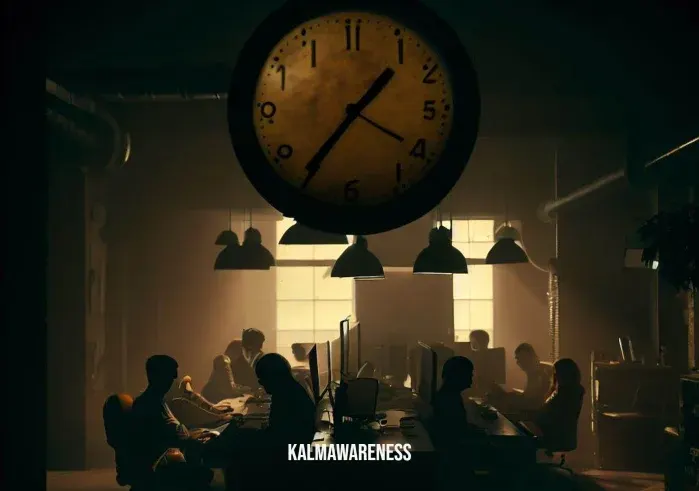Conquering Time Scarcity: An Insight into Efficient Time Management
Feel like you’re running out of time? You’re not alone. The sensation of time scarcity is something that most of us experience in our daily lives. In our contemporary world, time seems to slip through our fingers faster than ever, leaving us feeling overwhelmed and unproductive. But, can we reverse this?
Yes, we can.
This article aims to unravel the intricacies of time scarcity and presents solutions to conquer it, enabling you to lead a more efficient, productive, and balanced life. Let’s dive in!
Understanding Time Scarcity
The essence of time scarcity is the perception that there is never enough time to do everything we want or need to do. This idea is beautifully encapsulated in the article “If you don’t have time to do it right, when will you have time to do it over?”. It highlights the paradox of rushing through tasks due to perceived time scarcity, which often leads to errors that require more time to correct.
This dilemma underscores the need to better manage our time, to avoid mistakes that require more of this precious resource to fix. The more we understand this concept, the more equipped we are to tackle it effectively.
Time is what we want most, but what we use worst. – William Penn
Time Management and Productivity
Managing time effectively is vital for productivity. A key strategy in achieving this is by understanding and setting our priorities right, a concept we can dive deeper into by exploring “Mindful Management”. This resource emphasizes the importance of identifying what truly matters to us and investing our time accordingly.
In contrast to the popular belief of multi-tasking as a productivity booster, it often leads to the opposite effect. The article “Which is better: Mindfulness or Multitasking?” offers an in-depth view on this. It underscores how mindfulness, the practice of focusing on one task at a time, can dramatically improve productivity and reduce feelings of time scarcity.
Role of Meditation in Tackling Time Scarcity
Meditation plays a significant role in overcoming the feeling of time scarcity. It helps us stay present and mindful, thus promoting efficiency. You can explore the benefits of various types of meditations like the “5-minute meditation for focus” or “20-minute meditation for anxiety”, each tailored to cater to specific needs and time constraints.
The practice of meditation encourages us to slow down and focus, effectively addressing time scarcity. It can help us become more aware of each moment, making us feel that time is expanding, not contracting.
The Need for Balance
Life isn’t just about work and productivity. A balanced life involves finding time for relationships, leisure, and self-improvement. For instance, reading “Things to be grateful for at work” can inspire us to appreciate our workplace and colleagues, which in turn can create a more positive environment that diminishes feelings of time pressure.
On the flip side, the notion of “Smart Laziness” encourages us to take efficient breaks, recharging ourselves for better productivity. It’s about working smarter, not harder.
Continue exploring the world of time management with us in the next section of this article. We will delve into some more aspects of time scarcity, the relationship between time perception and age, the concept of ‘time anxiety’, and how to develop a ‘time abundance’ mindset. Stay tuned!

The Mechanics of Time Scarcity and Strategies to Counteract
Now that we have a basic understanding of what time scarcity is and how it can be managed, let’s delve deeper into some unique perspectives on this issue and the strategies we can employ to counteract its effect on our lives.
The Perception of Time: How it Changes as We Age
It’s quite common to hear people remark that time seems to pass faster as they age. This concept, explained in the article “Is there a limit to how much you can learn in a day?”, elucidates how our perception of time alters as we age. Understanding this can help us adapt our time management strategies accordingly as we mature, mitigating feelings of time scarcity.
Time Anxiety: An Offshoot of Time Scarcity
Another critical aspect of time scarcity is time anxiety. It’s the constant worry about wasting time, not having enough time, or being uncertain about future plans. This is detailed in “Precrestination”, illustrating how excessive concern over future events can impact our perception of time and exacerbate time scarcity.
Developing a ‘Time Abundance’ Mindset
While time scarcity leaves us feeling drained and rushed, time abundance, on the other hand, makes us feel that we have enough time to complete our tasks efficiently. The article “Finding Your Center Meaning” offers useful insights into cultivating a time abundance mindset.
Strategies to Cultivate Time Abundance:
- Mindful Moments: Consciously taking time to be present, as outlined in the “After Work Meditation”, can help create a sense of abundance.
- Balanced Schedule: Regularly updating and balancing our schedules, as suggested in “Start Doing”, ensures we allocate time for all necessary activities.
- Strategic Breaks: Breaks taken at regular intervals, as advised in “Action Vs. Activity”, can replenish our energy levels and increase productivity.
Tools and Techniques to Combat Time Scarcity
Beyond these strategies, there are also numerous tools and techniques available to assist us in our battle against time scarcity. The article “Be Smarter than Your Smartphone” suggests leveraging technology to our advantage, using apps and software designed to enhance productivity and time management.
To summarize the strategies and tools used to combat time scarcity, let’s view them in the table below:
| Strategies | Tools | Related Resource |
|---|---|---|
| Mindful Moments | Meditation Apps | After Work Meditation |
| Balanced Schedule | Time Management Apps | Start Doing |
| Strategic Breaks | Productivity Tools | Action Vs. Activity |
| Cultivating a Time Abundance Mindset | Mindfulness Techniques | Finding Your Center Meaning |
| Utilizing Technology | Smartphone Apps | Be Smarter than Your Smartphone |
In the next part of the article, we will delve into the concept of ‘chronotypes’ and how they can affect our productivity and time scarcity. We will also explore the impact of our lifestyle and environment on time perception. Stay with us for more exciting insights into the world of time management and productivity!

Chronotypes, Lifestyles and Environment: Their Influence on Time Scarcity
Welcome to the next part of our exploration into the multifaceted world of time scarcity. In this section, we will delve into the world of chronotypes and learn about their impact on our time management abilities. We will also examine how our lifestyle choices and the environment in which we live can drastically affect our perception of time.
Understanding Chronotypes
Chronotypes refer to our body’s natural inclination towards sleep and wakefulness throughout the day. Everyone has a unique chronotype, and it can significantly impact how we experience time scarcity. For a deeper understanding of the concept, take a look at the article “If I Had to Choose Between Loving You and Breathing”, which offers a fascinating insight into how our biological rhythms can affect our time management.
“The trouble is, you think you have time.” – Buddha
Identifying your chronotype and aligning your tasks to it can reduce feelings of time scarcity as you’ll be working in harmony with your body’s natural rhythms.
Lifestyle Choices and Time Scarcity
Our lifestyle choices play a substantial role in how we perceive time. Certain habits and routines can lead us to feel rushed, creating a sense of time scarcity. On the other hand, choosing healthier habits can have the opposite effect. The article “Thriving and Surviving” provides a comprehensive look at how our lifestyle choices can impact our time perception and offers valuable tips on creating healthy habits.
“You will never find time for anything. If you want time you must make it.” – Charles Buxton
Adopting healthy lifestyle habits like regular exercise, proper nutrition, and sufficient sleep can make us more efficient, effectively countering time scarcity.
The Role of Environment in Time Perception
Our environment is another major factor that can impact our perception of time. Living in a noisy, chaotic environment can leave us feeling overwhelmed and rushed, exacerbating feelings of time scarcity. However, cultivating a calm and serene environment can help us feel more in control of our time. The piece “Common Sense and Compassion in the Workplace” further expounds on the importance of a conducive environment for proper time management.
“Time and tide wait for no man.” – Geoffrey Chaucer
Implementing simple strategies like decluttering your workspace, adding calming elements like plants or soothing music can make a significant difference in our perception of time and our ability to manage it effectively.
In the next part of our series on time scarcity, we’ll explore the psychological aspects of time scarcity, including how our mindsets and attitudes towards time can influence our feelings of time scarcity. We’ll also delve into various psychological strategies and techniques to combat time scarcity. Stay tuned for more insightful discussions on the complex issue of time scarcity.

Psychology, Mindsets and Techniques: Navigating Through Time Scarcity
Welcome to the next segment of our comprehensive guide on the concept of time scarcity. In this part, we will venture into the psychological domain, exploring how our mindset and attitude towards time can affect our perceptions of time scarcity. Furthermore, we will share some effective psychological strategies and techniques that can help us counter time scarcity more effectively.
The Psychology of Time Perception
The way we perceive time is not always a direct reflection of reality. Instead, it is often shaped by our psychological state. If we are stressed or overwhelmed, time may seem to slip away faster, leading to a feeling of time scarcity. Conversely, when we are relaxed and at ease, time may appear to move slower. For a more detailed exploration of the psychological aspect of time perception, read the article on “Is There a Limit to How Much You Can Learn in a Day?”.
“The future is something which everyone reaches at the rate of sixty minutes an hour, whatever he does, whoever he is.” – C.S. Lewis
The Impact of Mindsets on Time Scarcity
Our mindset towards time is another crucial factor that can significantly influence our perception of time scarcity. If we view time as a scarce resource that’s always running out, we’re more likely to feel rushed and overwhelmed. Changing this mindset and viewing time as abundant can help alleviate feelings of time scarcity. Check out “Who’s on Your Mind, Who Got Your Time?” for an in-depth look at the role of mindset in managing time scarcity.
“Do not wait: the time will never be ‘just right’. Start where you stand, and work with whatever tools you may have at your command, and better tools will be found as you go along.” – Napoleon Hill
Techniques to Combat Time Scarcity
There are various techniques that we can employ to counteract feelings of time scarcity. These include practicing mindfulness, setting realistic goals, and prioritizing tasks. For a practical guide on how these techniques can help combat time scarcity, refer to the article on “How and Why to Stop Multitasking by Peter Bregman”.
“Your time is limited, don’t waste it living someone else’s life.” – Steve Jobs
Here is a table summarizing these techniques and their potential benefits:
| Technique | Description | Benefit |
|---|---|---|
| Practicing Mindfulness | Stay present and focused on the current moment | Reduces stress and anxiety, leading to better time management |
| Setting Realistic Goals | Establish achievable objectives | Helps prevent feelings of overwhelm and time scarcity |
| Prioritizing Tasks | Determine the importance and urgency of tasks and tackle them in order | Allows for effective time management by focusing on tasks that matter most |
| Changing Mindset | View time as abundant rather than scarce | Alleviates feelings of time scarcity by encouraging a more positive outlook on time |
In the next segment of our series on time scarcity, we’ll explore the impact of societal and cultural factors on our perceptions of time scarcity. Additionally, we’ll examine how various cultures around the world view and manage time. Continue on with us as we delve deeper into the complex world of time scarcity.

Societal and Cultural Dimensions of Time Scarcity
Welcome to another insightful chapter of our extensive series on time scarcity. As we venture forward, we will unfold the layers of societal and cultural impacts on our perceptions of time scarcity. We will explore how different cultures view time, and how societal norms and values can impact our feelings of time scarcity.
The Society and Time Scarcity
Societal norms and values significantly influence our perception of time and our relationship with it. Modern societies, particularly in the Western world, place high value on productivity, efficiency, and speed. This “time-is-money” perspective often results in a feeling of constant rush and time scarcity. This topic is eloquently expanded on in the piece “Busy is a Decision” by Debbie Millman.
“The trouble with being in a rat race is that even if you win, you’re still a rat.” – Lily Tomlin
Cultures and Their Perception of Time
Different cultures have different views on time. For instance, in many Western cultures, time is viewed as linear and sequential – a perception also known as ‘monochronic’. This is in stark contrast to many Eastern cultures, where time is viewed as cyclical and flexible – referred to as ‘polychronic’. These cultural differences can significantly influence how individuals perceive and manage time scarcity. For a more comprehensive understanding, refer to “Understanding Cultural Differences in the Workplace”.
“Time is a created thing. To say ‘I don’t have time,’ is like saying, ‘I don’t want to.'” – Lao Tzu
Addressing Time Scarcity Through Social and Cultural Changes
Addressing time scarcity isn’t just an individual pursuit. It also requires societal and cultural changes. We need to challenge the norms that equate busyness with productivity and self-worth. Also, embracing cultural views that promote a more balanced and flexible approach to time can be instrumental. Explore these concepts further in “Busyness is Not a Virtue” by Ilya Pozin.
“Time you enjoy wasting is not wasted time.” – Marthe Troly-Curtin
As we continue in the next chapter, we will examine the economic aspects of time scarcity. This will include the impact of time scarcity on economic decisions and how it influences consumer behavior. Let’s embark on this journey to unravel the economic implications of time scarcity. Stay tuned!

Wrapping Up: A Light on Time Scarcity
Welcome, dear readers, to the final chapter of our series. Our journey so far has taken us through various dimensions of time scarcity. We have explored its psychological aspects, the role of technology, its societal and cultural impacts, and its economic implications. We’ve built a comprehensive understanding of how time scarcity, or the shortage of time, affects our lives, and how it’s deeply interwoven into our modern existence.
Time Scarcity and Mindfulness
As we wrap up, it’s essential to bring up the concept of mindfulness, which stands as a beacon of hope amidst the whirlwind of time scarcity. Mindfulness – the practice of being present and fully engaged with whatever we’re doing at the moment – seems like a simple solution. It allows us to break free from the incessant need to do more and, instead, focus on doing well. This thoughtful piece “The Art of Mindfulness: Why Mindfulness Matters” by Elise Bialylew offers a deeper understanding of mindfulness and its benefits.
Lessons Learned
The concept of time scarcity can feel overwhelming, but it is vital to remember the lessons we’ve learned on this journey. Time scarcity is as much a product of our perception and cultural conditioning as it is of the tangible time we have at our disposal. Understanding this can empower us to regain control over our time, prioritize essential aspects of life, and feel less rushed or ‘time-poor.’ For a quick recap of our journey, refer to “Understanding Time Scarcity: Key Takeaways”.
The Journey Ahead
While we conclude our series on time scarcity, we don’t end our exploration of profound topics that touch our daily lives. We hope this series has given you not just valuable insights but also the inspiration to dig deeper, question norms, and seek answers. With our upcoming series on various topics, we continue on our shared journey of discovery, growth, and understanding. For a sneak peek into our future discussions, do visit “Upcoming Exciting Topics”.
“The two most powerful warriors are patience and time.” – Leo Tolstoy
Thank you for joining us on this journey. We hope you’ve found it as enriching as we’ve found creating it. Here’s to exploring more enlightening topics, uncovering truths, and continuing our quest for knowledge together. After all, as Henry David Thoreau rightly said, “The price of anything is the amount of life you exchange for it.”
In conclusion, the time scarcity we often experience can be mitigated by changing our perceptions, embracing mindfulness, and challenging societal and cultural norms. And as we part ways with this series, remember, the time spent in learning and growing is never time wasted.
“Time spent in self-reflection is never wasted – it is an intimate date with yourself.” – Dr. Paul T. P. Wong
On that note, we look forward to welcoming you back for more enriching discussions in our forthcoming series. Until then, may each moment you live be a celebration of life, free from the shackles of time scarcity.




